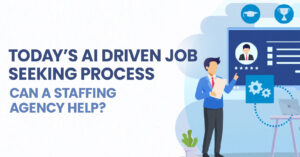Employers must get on the same page with their talent by reconceptualizing what it means to work for their organization.
According to The U.S. Board of Labor, 4 million Americans quit their job in the summer of 2021. The workforce is operating under the weight of The Great Resignation, and it isn’t looking to slow down anytime soon. In fact, a recent Procom Voice of Talent Report of over 1000 knowledge workers across North America finds 52 per cent of respondents are “likely” to “very likely” be looking to leave their current position within the next 12 months.
For employers, this means they must act now in order to rescue their workers from joining what’s been dubbed, The Great Resignation.
What caused The Great Resignation?
The pandemic has caused workers to re-evaluate what matters most to them when it comes to achieving a better work and life balance. Data shows top motivating factors for why talent would leave include: workers are overwhelmed and burnt out in their current role, are experiencing a lack of career growth at their current organization and would leave for a higher salary or pay rate.
Strategies to increase retention
Even amid an uncertain time, talent is optimistic about their future, and they have choices. If you’re responsible for increasing retention within your organization, consider the following strategies:
Embrace hybrid and remote work models
Procom data suggests it would be a mistake to force talent back to the office five days a week. Talent’s preferences for work have changed dramatically, with less than 5 perm cent of workers still favoring a five day onsite work week.
Remote work has proven to be a successful model for both employers and talent. As organizations consider the next phase of workplace strategy, it’s important to include hybrid and remote options in order to stay relevant as a competitive place to work.
Consider ‘Work-from-Anywhere’
For many, working remote means working from anywhere, with 34 per cent of talent indicating they expect remote work to include engagements that cross global boundaries.
However, The expanding scope of Work-from-Anywhere means employers need to consider how their workforce will span a larger geographic footprint. How will this be impacted by jurisdictional global employment laws and other corporate tax implications?
This type of remote work model will open organizations up to new risks
associated with health, safety and financial considerations.
Have clear COVID-19 Health and Safety Protocols in place
How and when employers bring talent back to the office will have long-lasting impacts on both corporate culture and worker trust. Sixty-four per cent of talent cite would ‘feel uncomfortable’ or ‘would not return’ to the office without mandatory vaccination policies.
Before bringing talent back in any capacity, it’s critical for employers to pay careful attention to demonstrating offices are safe or risk losing valuable contributors.
Provide opportunities for growth
Employment engagement research finds a significant predictor of whether employees are engaged is how enthusiastically they answer the question, “Does my job make good use of my skills?” As such, it’s important for employers to demonstrate that they value their workers by providing opportunities to grow and advance in their skillset(s).
Survey data from Harvard Business Review shows that 68 per cent of workers around the world are willing to retrain and learn new skills.
Take a proactive approach to retention
Many forward-thinking organizations are taking a proactive approach to keeping talent by implementing retention interview programs. This is done by asking workers what it would take for them to stay.
Make culture and connection a priority
Social connections have proven to have a significant positive impact on productivity. As such, it’s important for employers to connect and build relationships with their workers as well as provide channels for social interaction. Does your organization offer incentive programs, host virtual events or run contests?
Establishing and maintaining a strong corporate culture is critical to retention when workers are re-prioritizing their work/life balance.
Take care of your people
It’s important for organizations to show that they are willing to invest in the wellbeing of their people. Do you offer mental health or childcare programs? Have you adjusted your work model to offer greater flexibility? Taking care of your talent and their families helps demonstrate recognition and value for the work that’s done.
The pandemic has produced a monumental shift in attitudes, priorities, and values. The stiff, pre-COVID workforce posture is obsolete, and the modern workplace is evolving with a myriad of remote, hybrid, and flexible options that are employee-focused and supportive.
For deeper insights into how to attract and retain talent through The Great Resignation, download a complimentary copy of Procom’s Voice of Talent Report.




